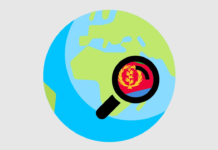
Lire la version en français / Hier auf Deutsch lesen
Of all the countries with the most appalling human rights records, Eritrea is probably the least known internationally.
Even folks who don’t have anything to do with foreign affairs are generally aware of North Korea’s horrors and Saudi Arabia’s long list of abuses.
Eritrea’s? Not so much.
However, once you learn about this country in the Horn of Africa, you’ll never forget.
For more than 30 years since gaining independence in 1993, Eritrea has suffered under the one-man rule of unelected President Isaias Afewerki. There are no independent courts, no legislature – essentially nothing to check his power.
Afewerki and his regime call all the shots, and no dissent is allowed. Opposition parties can’t operate. There are no independent civil society groups and no independent media.
Perhaps the most serious set of human rights abuses in the country concerns the government’s policy of indefinite national service, including compulsory military conscription.
The authorities draft Eritreans – both men and unmarried women, including students and children – and you have to stay in the military or civil service until… who knows? Two years, five years, fourteen years, more? That’s the “indefinite” part: your national service doesn’t end until the government says it ends. It’s completely arbitrary.
And for all those uncountable years you’re a conscript, you’ll often be facing inhuman and degrading punishment, including torture. Oh, and if you try to evade the draft, the authorities will retaliate against your family.
It’s no wonder so many Eritreans try to escape the country and end up as refugees abroad. Often they attempt to get to the EU, where most people are unaware of their plight and where some people elect politicians promising to punish refugees on the misguided notion that being cruel here will somehow stop people fleeing unknown situations elsewhere.
International ignorance about Eritrea (and other human rights crisis zones) is thus not just a shame intellectually; it has impacts on politics close to home.
One of the few ways the international community draws at least some attention to Eritrea’s abuses is through the office of the UN Special Rapporteur on the situation of human rights in Eritrea, Dr. Mohamed Abdelsalam Babiker. He recently delivered a report to the UN Human Rights Council in Geneva, outlining the horrors mentioned above and much more.
Next week, his mandate comes up for renewal. Some countries, like Russia and Iran, are trying to sink it, but let’s hope other countries manage to push it through.
The suffering of the people of Eritrea gets barely any attention in this world. It demands at least this.







